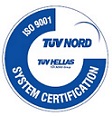Philadelphia’s Greek-American Community gathers to learn about CLEO Research
Philadelphia, PA- On Tuesday, June 30, 2015, Philadelphia’s Greek-American community gathered at Estia Restaurant in Philadelphia to learn about the Collaborative Center for Clinical Epidemiology and Outcomes (CLEO) presented by Dr. Theoklis Zaoutis, M.D., M.S.C.E. Established in 2011, CLEO is a joint effort between the Department of Pediatrics of the “Aghia Sophia” and Children’s Hospital, Athens, Greece and the Department of Pediatrics “P. & A. Kyriakou” Children’s Hospital, Athens, Greece.
CLEO is at the forefront of creating proper hygiene mechanisms in hospitals in order to prevent Hospital Acquired Infections (HAI) and the proper use of antibiotics. Dr. Zaoutis is a Professor of Pediatrics and Epidemiology at the Perelman School of Medicine, Chief, Division of Infectious Diseases, The Children’s Hospital of Philadelphia and founder & Scientific Director of CLEO. He has a plethora of knowledge of his field in which enables him to work hard towards making CLEO’s initiative a reality. The audience listened attentively as he described the circumstances in the Greek hospitals, and how CLEO is trying to minimize HAI in hospitals, which is predominantly caused by a dearth of proper hygienic precautions.
Mr. Chris Cosfol of AHEPA introduced the hard working committee that organized the event in honor of CLEO. The event was a collaborative effort between AHEPA, Daughters of Penelope, Hellenic Medical Society and National Hellenic Students Association. Sandy Tzaferos, President of the Hellenic Medical Society of Philadelphia had the pleasure of introducing Dr. Theoklis Zaoutis to the audience. She highlighted on Dr. Zaoutis prestigious resume and what an honor it was to have him present that night on such a powerful initiative such as CLEO.
Dr. Zaoutis, started off by sharing a couple of key facts regarding Greece’s healthcare. He informed the audience that at least 10% of hospitalized patients in Greece deveop a HAI, which leads to nearly 3,000 deaths per year. HAI can double a patient’s stay in the hospital, hence increasing the costs of healthcare. Greece’s healthcare system costs around 1.2 billion euros. But with CLEO’s education platform, they are able to show how easy it is to prevent HAI just by doing something as simple as washing your hands consistently.
Dr. Zaoutis had spent time in Greece a few years ago in an attempt to find a solution to this problem in the healthcare system, specifically at the Children’s Hospital in Athens. As an innovator, he realized he needed to implement a system that would alleviate the pervasive HAI issue. With the support of the Stavros Niarchos Foundation, he was able to start the CLEO Research Center. “The initial objectives of our work was to prevent harm and improve care for hospitalized patients in Greece, primarily through the prevention Hospital Acquired Infections, which are infections that happen in the hospital. So you go into the hospital for problem X and you acquire something different, which could also make your condition worse and even cause death,” said Dr. Zaoutis.
The reason why HAI are CLEO’s main focus is because it is the main culprit responsible for the closure of several healthcare institutions in Greece. “The size of the HAI problem is equivalent to the size of the economic problem happening in Greece right now. The international community worries about the hospitals in Greece and this was the impetus for what we wanted to do,” said Dr. Zaoutis. He stressed to us that the real take home message is that the majority of these HAI’s are completely preventable. More importantly, preventing Hospital Acquired Infections helps alleviate the costs of healthcare and most importantly decreases deaths.





